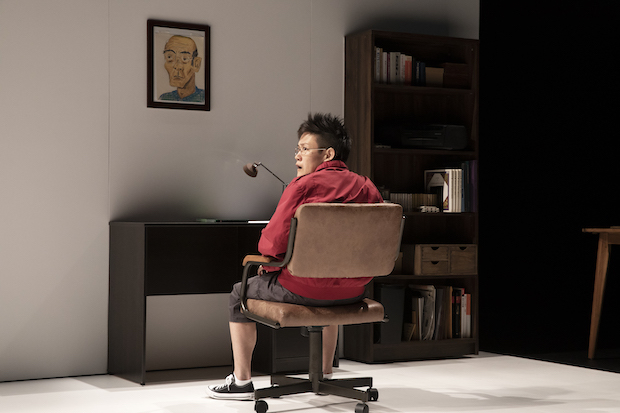Review: In The Nosebleed, Aya Ogawa Confronts Regretful Memories of a Difficult Dad

(© Julieta Cervantes)
"A deeply personal therapy session" is how I described Suicide Forest, the Haruna Lee play that made its world premiere at the Bushwick Starr in 2019 in a production directed by Aya Ogawa. That description also applies to the new play The Nosebleed, which Ogawa wrote and directed, and which explores similar themes of generational regret and cultural displacement. Whether such unabashedly personal exorcisms mean as much to viewers as to its creators is something audience members will have to determine for themselves.
Ogawa lays her aesthetic and thematic cards on the table right from the start. She comes onto the stage and kicks off the introductions of the four other performers — Ashil Lee, Kaili Y. Turner, Saori Tsukada, and Drae Campbell — who all play Aya onstage. Each performer is asked to share a story about when they felt most like a failure before they open it up to audience members to do the same. Such fourth-wall-breaking and audience-participation gambits alternate with more conventionally dramatic scenes to explore what Ogawa considers her own biggest regret: her failure to become better acquainted with her father before he died in 2007.
Not that Aya's father made it easy to get close to him. According to The Nosebleed, her father was often absent, and difficult to deal with when present. Ogawa dramatizes the only two serious conversations she ever had with him, one of them involving college finances. Otherwise, he kept a wall up throughout his life, enough of one for Ogawa to freely admit onstage that, growing up, she hated him. A revelation that he may have sexually harassed one of his employees at the corporation he worked at throughout his life leaves her especially ambivalent.

(© Julieta Cervantes)
Only after he has passed, however, does Ogawa feel pangs of regret that she didn't get to know him better. Or is that feeling dictated merely by a culturally mandated sense of filial piety? At one point in The Nosebleed, Ogawa recalls the initial sense of shame she felt after an encounter with a self-regarding wannabe-woke white man (played to the caricaturing hilt by Chris Manley) about not inculcating their two children into Japanese language and culture. Only after she brings her two children to Japan — during which one of them gets the play's titular nosebleed — does she realize how uninterested she was at doing so in the first place. What starts out seemingly unrelated to Ogawa's own paternal issues eventually hints at a broader exploration of American and Asian cultural differences.
It's an exploration that, however grim on paper, remains inventive throughout. Two of the performers reenact scenes from the season of The Bachelorette revolving around contestant Rachel Lindsay and potential beau Dean; one of the scenes, in which Dean admits to Rachel that he has a troubled relationship with his own father, seems as much an impetus for The Nosebleed as Ogawa's own personal issues. One audience-participation gimmick, in which we're all asked to write down questions we'd like to ask our own dads on a piece of loose-leaf paper that cast members collect from us, pays off in a moving onstage Buddhist-inspired ritual featuring shredded bits of those pieces of paper. And Princess Diana, of whom Ogawa once glimpsed her father drawing a picture, makes an appearance in a gesture that is both campy and touchingly sincere.

(© Julieta Cervantes)
True to the play's interest in operating as personal therapy — a feeling Jian Jung's clinical white-walled set intensifies — Ogawa saves the most lacerating material for herself by playing her own father at his most unforgiving and vulnerable. A scene in which one of the performers, playing Aya, witnesses Ogawa-as-her-dad towards the end of his life turns out to be the show's most harrowing moment, with Ogawa displaying impressive physical chops in her transformation. It's also the only scene where lighting designer Jeanette Oi-Suk Yew has the house lights turned down; the lights otherwise remain half-on in what one could interpret as a desperate bid to implicate us in Ogawa's own personal drama.
It's that desperation that may make The Nosebleed, for some, as easy to resist as it is easy to admire. With its reliance on audience-participation and metatheatrical devices, it's as if Ogawa was so worried about coming off as too insular, she felt a need to find ways to force her audience to confront the same questions she's been working through. Some may fully embrace her efforts, while others may wonder if all of this would be better kept between herself and her therapist. For my part, I did come out of The Nosebleed thinking of reaching out to my own father, so perhaps the discomfort the piece inspired in me was productive after all.











